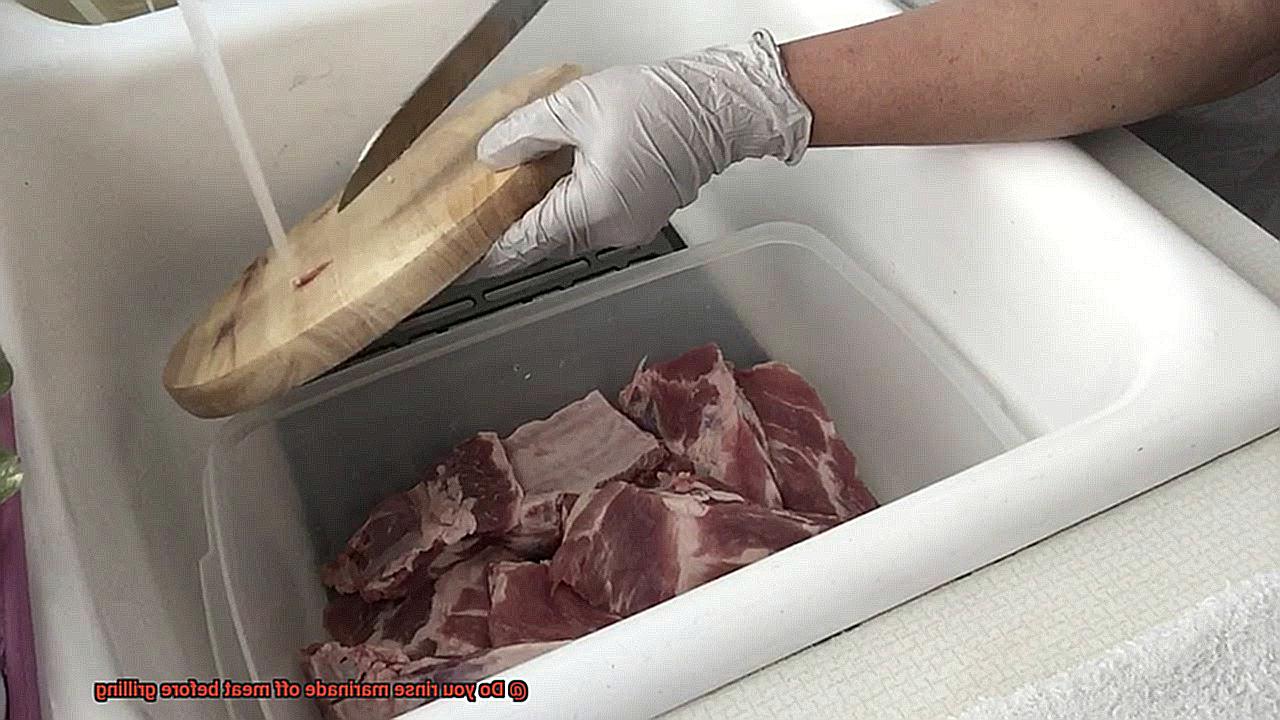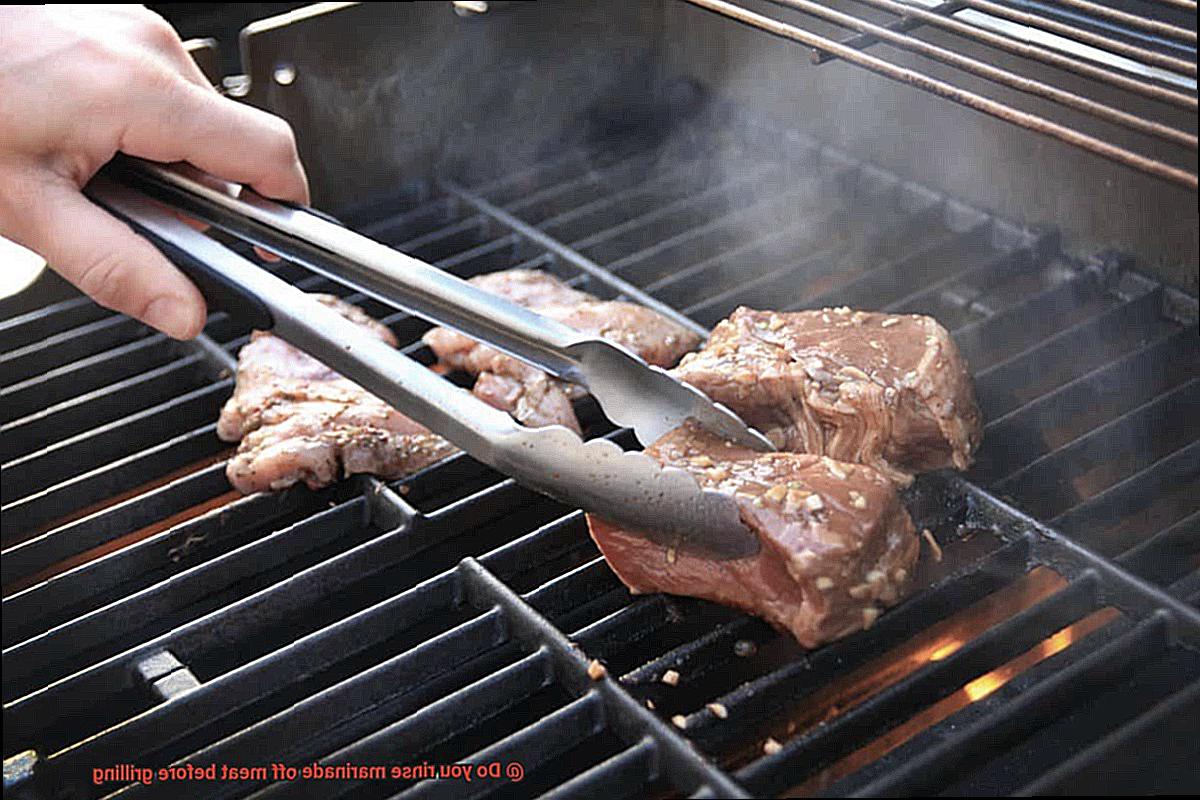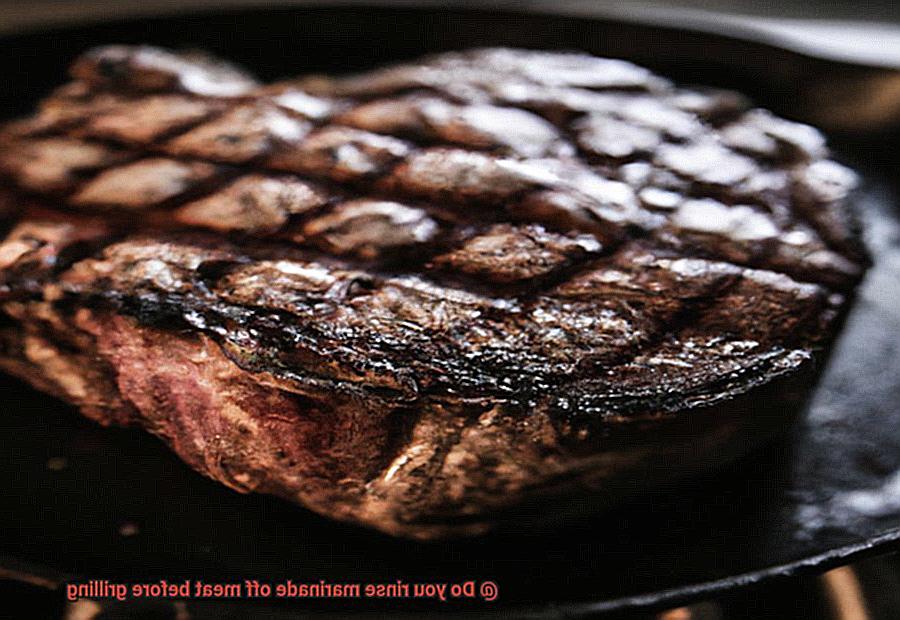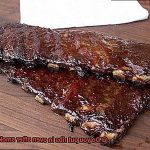It’s that time of year again, folks. Grilling season is upon us, and it’s time to fire up the grill and get cooking. But before you do, let’s address one of the most debated topics in the grilling community: should you rinse marinade off meat before grilling?
As a self-proclaimed grilling guru, I’ve heard this question countless times. Some people swear by rinsing their meat to prevent char and speed up cook time, while others argue that it removes all the delicious flavors from the marinade.
So what’s the truth? In this blog post, we’re going to dive deep into the science behind marination and rinsing. We’ll explore the pros and cons of each method and provide you with evidence-based insights on how it affects taste and texture.
Whether you’re a seasoned grill master or just starting out, this post will equip you with all the knowledge you need to make an informed decision about whether to rinse your meat or not. So grab your spatula and let’s settle this debate once and for all.
Contents
Pros of Rinsing Meat Before Grilling
Grilling meat is a beloved cooking method that has been enjoyed for ages. The use of marinades is a popular way to add flavor and tenderness to the meat. However, whether to rinse off the marinade before grilling is a topic of debate among food enthusiasts. In this article, we will explore the pros of rinsing meat before grilling and why it may be worth considering.
Firstly, rinsing off the marinade can reduce the risk of bacterial contamination. Raw meat can harbor harmful bacteria such as E.coli and salmonella, which can cause food poisoning if ingested. By rinsing off the marinade, any bacteria present on the surface of the meat can be washed away, reducing the risk of illness.
Secondly, rinsing off excess marinade can prevent flare-ups on the grill. Marinades often contain sugar or other sweeteners that can burn quickly when exposed to high heat. This causes flames to flare up and potentially char the meat. By rinsing off excess marinade, you can prevent these flare-ups and ensure that your meat cooks evenly.
Thirdly, rinsing off the marinade can also help improve presentation. Meat that has been marinated for an extended period can become discolored or even develop a slimy texture due to the breakdown of proteins. By rinsing off excess marinade, you can remove any discoloration or texture issues and present a more visually appetizing dish.
Fourthly, rinsing off excessive marinade can reduce the amount of sodium in your dish. Many marinades contain high levels of salt to help tenderize and flavor the meat. By rinsing off excess marinade, you can reduce your overall sodium intake without sacrificing flavor.
However, it is essential to note that rinsing off the marinade can also remove some of the flavor that you worked hard to infuse into your meat. Ultimately, whether or not to rinse off your marinade before grilling will depend on your personal preferences and priorities.

Cons of Rinsing Meat Before Grilling
You may be wondering whether it’s necessary to rinse off the marinade before cooking. While it may seem like a good idea, there are actually several cons to rinsing meat before grilling.

Firstly, by rinsing meat, you run the risk of spreading harmful bacteria around your kitchen. Any bacteria on the surface of the meat can easily contaminate your sink, countertops, and other surfaces, increasing the risk of cross-contamination and foodborne illness. So it’s best to avoid rinsing your meat altogether and simply cook it as is.
Secondly, rinsing meat can cause it to become dry and tough. When you wash off the marinade, you’re also washing away some of the flavor and moisture that the marinade provides. This can result in meat that is less flavorful and less tender than it would be if you left the marinade on.
Lastly, rinsing meat can be wasteful. If you’ve invested time and effort into creating the perfect flavor profile for your meat, why throw it all away by rinsing off the marinade? By leaving the marinade on your meat, you’ll not only avoid cross-contamination and foodborne illness but also enjoy more flavorful and tender meat.
To summarize, here are some reasons why you should avoid rinsing meat before grilling:
- It can spread harmful bacteria around your kitchen
- It can make the meat dry and tough
- It can be wasteful if you’ve invested in a delicious marinade
The Different Types of Marinades and How They Affect the Meat
Marinades are a staple in grilling, and it’s no wonder why. They can transform the flavor and tenderness of meat, taking it from ordinary to extraordinary. Understanding the different types of marinades and how they affect meat is essential to creating delicious grilled dishes. Let’s dive into the world of marinades and explore how they work.
Acidic Marinades: Breaking Down the Muscles
Acidic marinades are made with vinegar, citrus juice, or wine. These ingredients break down the muscle fibers in the meat and make it more tender. Acidic marinades are ideal for tougher cuts of meat like flank steak or pork shoulder. They also add a tangy flavor that pairs well with grilled vegetables.
Enzymatic Marinades: Natural Tenderizers
Enzymatic marinades use ingredients like pineapple, papaya, or ginger that contain natural enzymes that can break down muscle fibers in meat. These marinades are perfect for delicate meats like fish or chicken breasts. A word of caution: too much marination can break down the meat too much and turn it into mush.
Sweet Marinades: Caramelized Flavor
Sweet marinades add a caramelized flavor to meat and help it brown more evenly during cooking. Honey, sugar, and fruit juices like apple cider are common sweet marinade ingredients. These marinades pair well with pork and chicken dishes.
Savory Marinades: Depth and Complexity
Savory marinades add depth and complexity to meat’s flavor profile. Soy sauce, Worcestershire sauce, beer, or red wine are common savory marinade ingredients. These marinades pair well with beef and lamb dishes.
Dry Rubs: Flavorful Crust
Dry rubs consist of spices and herbs that are rubbed onto meat before grilling. They create a flavorful crust on the meat and are perfect for beef brisket or ribs.
Brines: Moisture and Juiciness
Brines are made up of salt and water that meat is soaked in before grilling. They add moisture to the meat and help it stay juicy during cooking. Brines are perfect for turkey or chicken.
Now, the million-dollar question: Should you rinse off the marinade before grilling?
It depends on the type of marinade you’re using. If your marinade has a lot of sugar or salt, it can burn on the grill and create a bitter taste. In this case, it’s best to wipe off any excess marinade before grilling or use a brush to remove any excess. However, if your marinade is mild and doesn’t contain too much sugar or salt, you can leave it on for more flavor.
What Type of Meat Should You Rinse?
Grilling is one of the most exciting events of the summer, and it is essential to know how to prepare your meat correctly. The type of meat determines whether or not you should rinse it before cooking. For instance, poultry like chicken or turkey must be rinsed to eliminate bacteria such as salmonella that can cause food-borne illnesses. However, rinsing red meats such as beef or pork can lead to cross-contamination and spread bacteria around your kitchen sink.
It is worth noting that even when rinsing poultry, running water is not recommended because it can spread bacteria to other surfaces. Instead, place the poultry in a clean sink and cover it with cold water, gently agitating it to remove any excess bacteria on the surface.
When it comes to seafood, there are varying opinions on whether or not to rinse it before grilling. Some grill masters argue that rinsing seafood can get rid of potential dirt or debris on the surface, while others believe it can cause the seafood to lose its natural flavor. Ultimately, whether or not you decide to rinse your seafood before grilling is a personal preference.
Tips for Rinsing Marinated Meats
Grilling marinated meats is a surefire way to add flavor and tenderness to your dishes. However, before throwing them on the grill, you may be wondering whether or not to rinse the meat. While there is no hard and fast rule, here are some tips and tricks to keep in mind:
- Check the Recipe: The first step in determining whether or not to rinse your marinated meat is to check the recipe. Some marinades are designed to be left on the meat throughout the cooking process, while others may require rinsing off beforehand.
- Use Cold Water: If you do decide to rinse your meat, be sure to use cold water rather than warm or hot water. Warm water can begin cooking the meat, leading to uneven cooking and texture changes.
- Be Gentle: When rinsing the meat, remember to be gentle. Avoid scrubbing or rubbing too vigorously as this can damage the surface of the meat, causing it to lose moisture. Simply run it under a gentle stream of water until all excess marinade is removed.
- Pat Dry: Once you have rinsed your meat, pat it dry with paper towels or a clean cloth. This helps remove any excess moisture that might prevent proper browning on the grill.
- Bring Meat to Room Temperature: Before grilling your meat, ensure that it comes to room temperature. This helps it cook more evenly and prevents it from becoming dry.
- Experiment with Different Methods: Ultimately, whether or not to rinse your marinated meat comes down to personal preference. Experiment with different methods and find what works best for you and your taste preferences.
How to Prepare Your Grill for Marinated Meats
Grilling marinated meats is a mouth-watering experience, but it requires a little bit of preparation to ensure that your meat cooks evenly and has a delicious char. Here are five easy steps to prepare your grill for marinated meats.
Step 1: Start with a Clean Grill
The first step in preparing your grill for marinated meats is to make sure it’s clean. This means removing any leftover residue from previous grilling sessions. To do this, heat up your grill to a high temperature for about 10-15 minutes. This will burn off any remaining debris and bacteria on the grates. Then, use a wire brush to scrape the grates clean. Make sure to remove any leftover food particles, as they can stick to your marinated meat and affect the flavor.
Step 2: Oil Your Grates
Prevent your marinated meat from sticking by oiling the grates. You can use a paper towel dipped in vegetable oil or cooking spray for this step. Be sure to do this before preheating your grill so that the oil has time to heat up and create a non-stick surface.
Step 3: Let Your Meat Come to Room Temperature
Before placing your marinated meat on the grill, make sure that it’s at room temperature. This will ensure that it cooks evenly and doesn’t dry out. You can also pat the meat dry with paper towels to remove any excess marinade.
Step 4: Check Your Grill Temperature
Make sure that the temperature of the grill is at the appropriate level for your recipe. You can use a thermometer to check the temperature of the grill or simply hold your hand over the grates. If you can only hold your hand over the grill for a few seconds before it becomes too hot, then you’re ready to start cooking.
Step 5: Cook Your Meat
Once your grill is prepped and ready, it’s time to cook your marinated meat. Remember not to overcrowd the grill as this can cause uneven cooking and result in some pieces of meat being overcooked while others are undercooked. Follow the cooking instructions on your recipe and turn the meat over at regular intervals to ensure even cooking.
Alternatives to Rinsing Marinated Meats Before Grilling
Marinating meats before grilling is a popular technique that infuses flavor and tenderness into your favorite cuts. However, the question of rinsing the meat before grilling has sparked debate among grill enthusiasts for years.
While some argue that rinsing will remove excess salt and prevent flare-ups, others contend that doing so washes away the delicious flavors and tenderizing agents that the marinade provides. But fear not, there are alternatives to rinsing marinated meats that can help maintain flavor and tenderness while keeping your grill safe from flare-ups.
One alternative to rinsing is to pat the meat dry with paper towels before grilling. This simple step removes excess moisture on the surface of the meat, which can cause flare-ups when it hits the grill. Additionally, it allows the marinade to better adhere to the meat, resulting in more flavor and tenderness.
Another option is to use a marinade brush to remove any excess marinade from the surface of the meat. With this method, you have better control over how much marinade remains on your meat. It ensures that your meat is not too salty or overpowering in flavor, and also helps prevent flare-ups on the grill.
For those who want to go a step further, cooking marinated meats in foil packets or on skewers is an excellent method. This technique traps in moisture and flavor while preventing any excess marinade from dripping onto the grill and causing flare-ups.
F-wU562XZYQ” >
Conclusion
In the great debate about rinsing marinade off meat before grilling, there are valid arguments on both sides. Some grill masters swear by rinsing to prevent flare-ups and reduce sodium intake, while others argue that it washes away the delicious flavors and tenderizing agents in the marinade. Ultimately, it’s a personal choice based on your priorities.
While there are benefits to rinsing meat, such as reducing bacterial contamination and improving presentation, it can also be risky. Rinsing can spread harmful bacteria around your kitchen and make the meat dry and tough. Plus, if you’ve invested in a tasty marinade, why waste it?
To get the most out of your marinades, it’s essential to understand how they affect different meats. Acidic marinades break down muscle fibers for a more tender result, while enzymatic ones use natural ingredients like papaya or pineapple for the same effect. Sweet marinades add caramelized flavor to meat, while savory ones create depth and complexity.
If you’re not sold on rinsing your marinated meats before grilling, don’t worry. There are alternatives that can help prevent flare-ups and retain moisture without losing flavor. Patting meat dry with paper towels or using a marinade brush to remove excess from the surface are excellent options. Cooking marinated meats in foil packets or on skewers is another great technique that traps in moisture and flavor.






